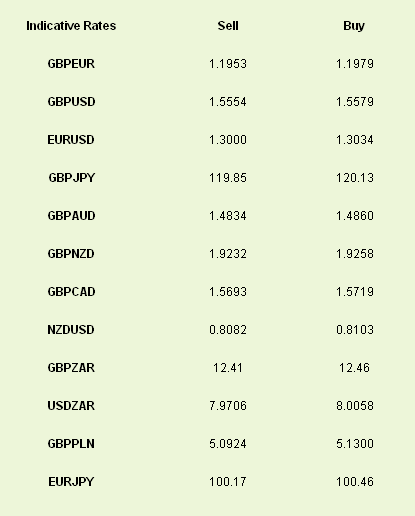Despite a lack of news flow yesterday, especially around the Greek PSI negotiations, risky assets remained in favour throughout the session pushing equities and the euro higher. There is a broad split in markets between the people out there who believe that the world is doomed and we will all be eating rocks for the rest of our lives and, those who think that recent good bond auctions, alongside better economic data from the US and an ok earnings season Stateside could be enough to move us away from the precipice. We are more with the latter than the former but concerns obviously still remain.
The single currency pushed beyond the 1.30 mark against the dollar for the first time in 3 weeks and GBPEUR retested the lows around the 1.1930 mark.
Part of the reason for the ebullience yesterday was a report from Germany saying that politicians there may be happier to boost the size of rescue packages in Europe to EUR750bn. This would be carried out via a combination of the European Financial Stability Facility’s EUR250bn and the EUR500bn put aside by the European Stability Mechanism. The Germans want something in return of course and this is that heads of government sign up to tougher rules to cut budget deficits and public debt and harsher penalties should countries break those rules. The IMF head Christine Lagarde has been campaigning for a bigger fund over the weekend and we expect similar noises out of her at the World Economic Forum in Davos that starts today.
The two debt auctions from Germany and France both went well yesterday with good demand seen for both. Once again this is mainly as a result of the bank liquidity created by the ECB’s lending operation and not a signal that a cure is on the way. It did however give risk a bit of backbone.
The deadline has now passed in Greece for an agreement on the losses private investors will have to sustain. It seems that the private investors suggested a maximum that they were willing to take on but Finance Ministers were not happy with the figure and rejected it.
Focus will remain on the Eurozone today with the publication of the “flash” or preliminary PMI numbers for January from France and the actual numbers from Germany and the Eurozone as a whole. Both the manufacturing and services components are expected to show positivity although only the services numbers from Germany and France are expected to show growth. These numbers will verify just how large the slowdown will be for the core countries moving forward; whether it is one quarter of negative growth or a full blown recession in other words.
We also have Industrial New Orders from the Eurozone at 11am which is expected to slash lower by 2.2% in November. The series is volatile so the magnitude should not be read into too deeply however.
Latest exchange rates at time of writing

The single currency pushed beyond the 1.30 mark against the dollar for the first time in 3 weeks and GBPEUR retested the lows around the 1.1930 mark.
Part of the reason for the ebullience yesterday was a report from Germany saying that politicians there may be happier to boost the size of rescue packages in Europe to EUR750bn. This would be carried out via a combination of the European Financial Stability Facility’s EUR250bn and the EUR500bn put aside by the European Stability Mechanism. The Germans want something in return of course and this is that heads of government sign up to tougher rules to cut budget deficits and public debt and harsher penalties should countries break those rules. The IMF head Christine Lagarde has been campaigning for a bigger fund over the weekend and we expect similar noises out of her at the World Economic Forum in Davos that starts today.
The two debt auctions from Germany and France both went well yesterday with good demand seen for both. Once again this is mainly as a result of the bank liquidity created by the ECB’s lending operation and not a signal that a cure is on the way. It did however give risk a bit of backbone.
The deadline has now passed in Greece for an agreement on the losses private investors will have to sustain. It seems that the private investors suggested a maximum that they were willing to take on but Finance Ministers were not happy with the figure and rejected it.
Focus will remain on the Eurozone today with the publication of the “flash” or preliminary PMI numbers for January from France and the actual numbers from Germany and the Eurozone as a whole. Both the manufacturing and services components are expected to show positivity although only the services numbers from Germany and France are expected to show growth. These numbers will verify just how large the slowdown will be for the core countries moving forward; whether it is one quarter of negative growth or a full blown recession in other words.
We also have Industrial New Orders from the Eurozone at 11am which is expected to slash lower by 2.2% in November. The series is volatile so the magnitude should not be read into too deeply however.
Latest exchange rates at time of writing

